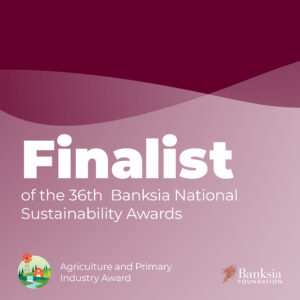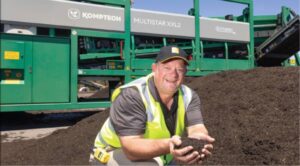Wandalup Farm, one of WA’s largest piggeries is a breeding station which supplies 12 week old pigs for growing on in a number of farms around WA. When first set up there was a good deal of local concern in the community about the possibility of pollution of the nearby Serpentine River and further downstream, the Peel Harvey Estuary.
A business opportunity was identified by Andy Gulliver and Dave Cullen who were searching for a location to start a compost business. By taking waste from the piggery, then combining with other waste streams there was potential to produce a range of composted products. Custom Compost as they were then known set up a composting facility alongside the piggery and commenced recycling all the farm waste.
Piggery waste streams consist of daily solids and liquids. Mixed straw and pig manure from eco-shelters is another resource. Originally there were also old sludges in settlement ponds.
Today the liquified material is captured in ponds where it is biologically cleaned up by aeration and settling. The sanitised, treated water is pumped back into the compost process to add necessary moisture. This same water is recycled in the piggery for washing processes and as such is a substitute for bore water.
The sludge ponds are dried and the solid material is loaded into the composting process.
The production of live mushroom compost for a large farm was one of the first enterprises of C-Wise. This connection is still in position though Mushroom Exchange now produces its own compost at the same Nambeelup property. C-Wise takes the spent or used compost from the farm to distribute as genuine mushroom farm compost to soil yards and into other composted product back at the Nambeelup facility. These high humus organic soil carbon materials are used to bring fertility to impoverished soils as well as intensive horticultural production.
Settling ponds have been designed to comfortably handle storm water runoff from the composting site. As a further failsafe containment mechanism, bunds have been constructed around an adjacent natural wetland on the property to ensure that no liquid wastes leave the property or get into the Serpentine River.
Farming activities on the property are aimed at keeping grass and vegetation down to fire safe levels. Pinjarra high school’s FLEEC students assist in planning and maintaining the property with improvements such as tree planting, wetland restoration, grazing with sheep, cattle and alpacas; and cropping barley.
An unexpected bonus emerged as the whole property was recognised as a safe haven for migratory wading birds from the Arctic circle. Some 115 species of birds have been identified from counts of the site. This compares favourable with the 130 species found in the massive Peel Harvey Catchment area.
Other wastes come from dairy, cereal, timber, mushroom, chicken, fish, paper and agricultural processing operations.
Composting expertise led to a range of products made to an advanced standard which has enabled certification by the Biological Farmers of Australia. A quality management system is in place under ISO 9001 certification to ensure every step in the production cycle meets the required standard. This approach is characterised by extensive measurements and extremely detailed documentation and record keeping standards all of which are independently audited twice per year.
For the Wandalup farm recycling project C-Wise was the overall 2005 Western Australian Environment Awards Winner.

The farm surrounding the compost facility is home to a flock of sheep

Waste water treatment takes place as part of the composting system

Organic resources from timber and grain growing are used in the composting process

Sludge ponds supply a rich organic resource when dried.







